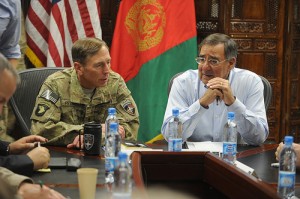After Trading Jobs, Petraeus and Panetta Have Traded Sides in Military vs. Intelligence Differences

Mid-trade photo of David Petraeus, left, and Leon Panetta in July, 2011 in Kabul when Petraeus headed ISAF/NATO and Panetta had just taken over as Defense Secretary. (Department of State photo via Flickr)
What a difference a year makes.
Here is the New York Times with some of the fallout from the Afghanistan National Intelligence Estimate prepared in December, 2010, in an article published about a week after the report was supplied to Congress:
American military commanders and senior Pentagon officials have already criticized the reports as out of date and say that the cut-off date for the Afghanistan report, Oct. 1, does not allow it to take into account what the military cites as tactical gains in Kandahar and Helmand Provinces in the south in the six weeks since. Pentagon and military officials also say the reports were written by desk-bound Washington analysts who have spent limited time, if any, in Afghanistan and have no feel for the war.
“They are not on the ground living it day in and day out like our forces are, so they don’t have the proximity and perspective,” said a senior defense official who spoke on the condition of anonymity because he did not want to be identified while criticizing the intelligence agencies. The official said that the 30,000 additional troops that Mr. Obama ordered to Afghanistan in December 2009 did not all arrive until September, meaning that the intelligence agencies had little time to judge the effects of the escalation. There are now about 100,000 American forces in Afghanistan.
/snip/
The dispute also reflects the longstanding cultural differences between intelligence analysts, whose job is to warn of potential bad news, and military commanders, who are trained to promote “can do” optimism.
A new National Intelligence Estimate for Afghanistan has been prepared and the Los Angeles Times yesterday reported on the estimate and its responses, including this:
The findings prompted a sharp response from Marine Corps Gen. John Allen, the U.S. commander of Western forces in the war, and Ryan Crocker, the U.S. ambassador to Afghanistan, who filed their objections in a one-page written dissent. The comment was also signed by Marine Corps Gen. James Mattis, commander of Central Command, and Adm. James Stavridis, supreme allied commander of the North Atlantic Treaty Organization.
Military and Pentagon officials argued that assumptions used by intelligence agencies were flawed.
“It assumes a quicker drawdown of U.S. support to the Afghan government than a lot of people are projecting, ” said one U.S. official familiar with Pentagon thinking, speaking of the assessment.
Military officials also cited what they claim are gaps in the intelligence agencies’ understanding of the Taliban leadership’s thinking, the officials said.
Although the details differ, the response by the military to the intelligence community’s assessment of Afghanistan is the same. In the face of sober doubts about progress from the intelligence community, the military’s “can-do” attitude claims that things are better than presented in the intelligence estimate, especially in the more recent events that weren’t included in the analysis or in anticipated events that the military sees as more positive than the intelligence community does.
What is remarkable about these two responses from the military (and the two analyses from the intelligence community) is that the two most visible heads of these communities have traded places between the two reports being issued. Read more →
